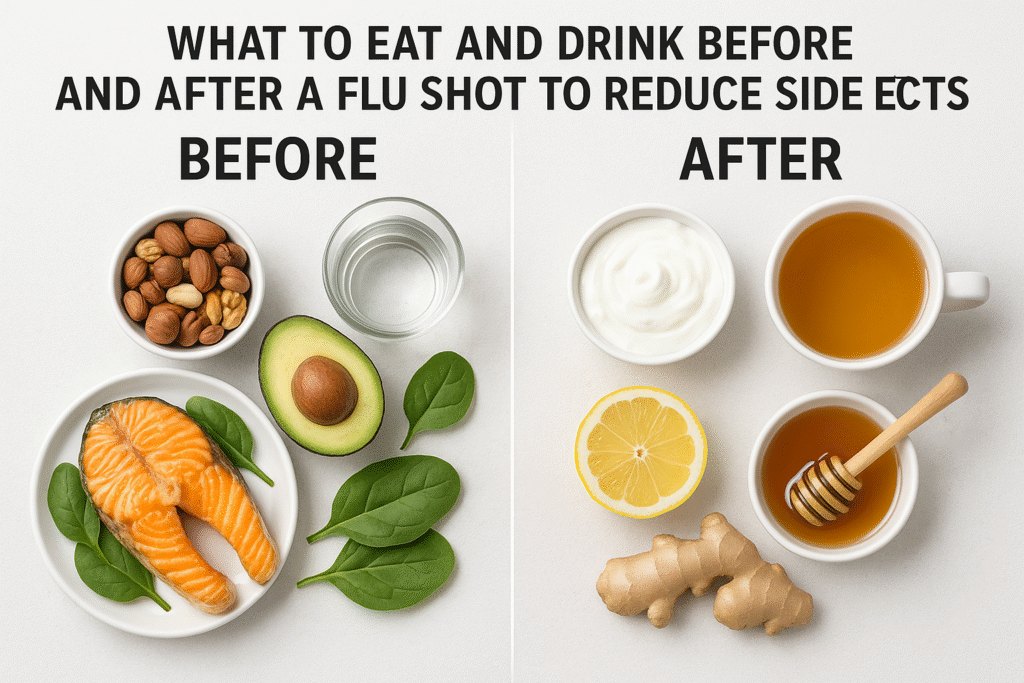By Harshit | October 5, 2025 | Washington, D.C. | 11:00 AM EDT
Getting an annual flu shot is one of the most important steps people can take to protect themselves against seasonal influenza. The Centers for Disease Control and Prevention (CDC) recommends yearly vaccination in the autumn or winter to help prevent infection and reduce the risk of serious complications.
Although flu vaccines are safe and effective, some people worry about flu shot side effects such as mild fever, muscle aches, or dizziness at the time of vaccination. Health experts say that choosing the right foods and drinks before and after the shot may help the body cope better with temporary discomfort.
Why Flu Shot Side Effects Happen
Common side effects include headache, fatigue, low-grade fever, nausea, and soreness at the injection site. These reactions are not harmful; they are signs that the immune system is responding to the vaccine and building protection.
Some individuals also report feeling faint during vaccination, often due to anxiety about needles rather than the vaccine itself. Diet and hydration can play a role in reducing these reactions and supporting the immune system.
What to Eat and Drink Before a Flu Vaccine
Hydration and light snacks are key before getting vaccinated, according to preventive cardiology dietitian Michelle Routhenstein, MS, RD, CDCES, CDN.
- Hydrate well: Drinking water or herbal tea helps maintain circulation and stable blood volume, reducing the risk of dizziness or fainting.
- Balanced snack: Foods with protein and complex carbohydrates—such as a banana with nut butter or yogurt with oats—help stabilize blood sugar and provide steady energy.
Şebnem Ünlüişler, MSc, Chief Longevity Officer at the London Regenerative Institute, added that even mild dehydration can increase dizziness, urging people to drink water or an electrolyte-rich beverage before their appointment.
What to Eat After a Flu Shot
After vaccination, the body launches an inflammatory response to build immunity. Nutrition can support this process and ease mild symptoms. Elena Rolt, MSc, a nutritional therapist, explained that key nutrients aid recovery:
- Protein for antibody production and immune cell repair.
- Beta-glucans and fiber to regulate immune responses.
- Vitamin C and antioxidants to reduce oxidative stress.
- Probiotics to support gut health, which influences immunity.
A nutrient-rich meal might include chicken broth with vegetables, mushrooms, and leafy greens, paired with a berry-based tea for added vitamin C. Rolt emphasized that this type of meal can “reduce potential side effects and optimize the body’s immune response.”
Ünlüişler also recommended turmeric and omega-3-rich fish to moderate inflammation without interfering with the immune system’s adaptive response. Plant proteins such as legumes and tofu are also excellent options.
Why Hydration Matters After Vaccination
Just as hydration is important before the flu shot, it remains critical afterward. Staying hydrated supports blood circulation, reduces headaches, and helps regulate body temperature. Experts recommend drinking water, herbal teas, or broths to minimize discomfort.
“Hydration may reduce the severity of side effects such as headache, fatigue, and muscle soreness,” Rolt noted.
A Healthy Diet for Flu Season
Dietitians stress that maintaining a nutrient-rich diet throughout flu season can complement vaccination. Foods high in polyphenols, zinc, selenium, and vitamins A, C, and E help strengthen immunity and support antibody production.
Examples include:
- Colorful fruits like berries and citrus
- Leafy greens and cruciferous vegetables
- Nuts, seeds, and legumes
- Lean meats, eggs, and fish
“While the flu vaccine lowers the risk of infection, it cannot guarantee complete protection. Combining vaccination with an anti-inflammatory, nutrient-dense diet helps the body fight viruses more effectively,” Routhenstein explained.
Bottom Line
Flu shots remain the best defense against seasonal influenza, but a healthy diet and proper hydration before and after vaccination can reduce discomfort and support the immune system’s response. Experts emphasize light snacks and fluids before the shot, balanced meals rich in protein and antioxidants afterward, and consistent nutrient-rich eating habits throughout flu season.
By preparing the body with the right foods and drinks, people can minimize flu shot side effects and maximize the benefits of annual vaccination.

